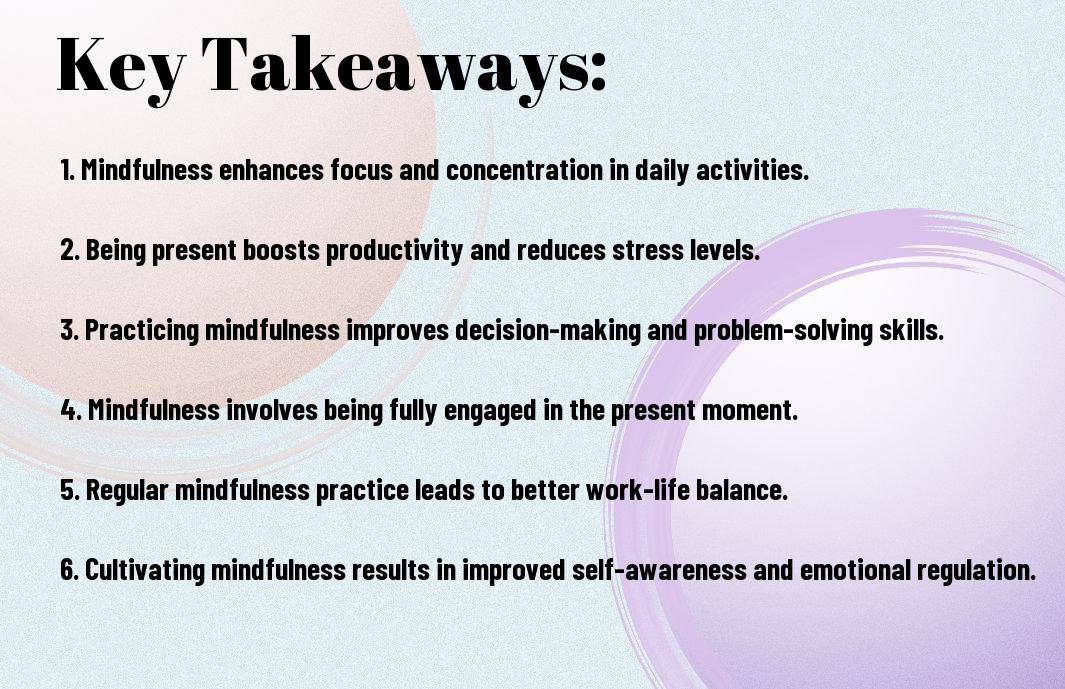Focus on unlocking the power of mindfulness with insights from Dan Koe’s book, The Art of Focus. In a world filled with distractions, learning to focus on the present moment can have profound effects on our mental well-being and overall quality of life. Koe’s book offers practical tips and exercises to help readers cultivate a mindful approach to everyday tasks and interactions.
Key Takeaways:
- Mindfulness is the practice of bringing attention to the present moment.
- Being present involves focusing on one task at a time rather than multitasking.
- Deep breathing can help in anchoring yourself in the present.
- Awareness of your thoughts and emotions can improve your mindfulness practice.
- Setting intentions can guide your focus and prioritize what matters most to you.
- Mindful listening involves giving your full attention to the speaker without distractions.
- Practice regularly to strengthen your mindfulness skills and cultivate a sense of peace and clarity.


The Foundations of Mindfulness
If we were to explore into the foundations of mindfulness, it’s imperative to understand the essence of being present, which is at the core of this practice. Mindfulness, as described by Dan Koe in ‘The Art of Focus,’ is about honing our ability to focus on the current moment without judgment. It involves being fully aware of our thoughts, feelings, bodily sensations, and surrounding environment.
Defining Mindfulness in Today’s World
Mindfulness is more relevant today than ever before, given the fast-paced and constantly connected world we live in. In a world filled with distractions and multitasking, the art of mindfulness offers us a way to center ourselves and find peace amid the chaos. It’s about cultivating a sense of clarity and attention in everything we do, whether it’s eating a meal, engaging in a conversation, or simply breathing.
Historical Roots and Modern Connections
To understand the roots of mindfulness, we can trace its origins back to ancient Eastern philosophies and practices such as Buddhism and Yoga. These traditions have long emphasized the importance of being present and cultivating awareness in every moment. In today’s fast-paced Western society, the modern connections to mindfulness can be seen in the rise of mindfulness-based practices like mindfulness meditation, stress reduction programs, and other therapeutic techniques that incorporate its principles.
Core Principles of Mindfulness According to Dan Koe
After submerging into ‘The Art of Focus’ by Dan Koe, we uncover the core principles of mindfulness that can truly transform our lives. Koe emphasizes the importance of being present in the moment and practicing non-judgmental observation as key components of a mindful lifestyle.
Present Moment Awareness
Core to mindfulness is the practice of present moment awareness. This means focusing on the here and now without letting our minds wander to the past or future. By centering our attention on the present, we can fully experience each moment as it unfolds, leading to a greater sense of peace and clarity in our daily lives.
Non-Judgmental Observation
Non-Judgmental observation is another crucial aspect of mindfulness according to Dan Koe. This involves viewing our thoughts, emotions, and experiences without attaching any value judgments to them. Instead of labeling things as good or bad, we strive to simply observe them as they are, fostering acceptance and compassion towards ourselves and others.
By practicing non-judgmental observation, we can cultivate a greater sense of emotional well-being and mental clarity. This allows us to break free from the cycle of negative self-talk and harsh criticism, leading to a more positive and balanced mindset.
Mindfulness and the Art of Focus
Once again, let’s explore into the world of mindfulness and the art of focus as presented in Dan Koe’s book. The concept of mindfulness is a powerful tool that can significantly enhance our ability to concentrate and excel in various aspects of life.
The Role of Mindfulness in Enhancing Concentration
Concentration is fundamental to achieving success in any task we undertake. Mindfulness plays a crucial role in sharpening our focus and improving our concentration levels. By being fully present in the moment and aware of our thoughts and feelings, we can eliminate distractions and channel our energy towards the task at hand with clarity and purpose.
Overcoming Distractions with Mindful Techniques
Overcoming distractions is a common challenge we face in our daily lives that can hinder our productivity and focus. In the book, Dan Koe introduces various mindful techniques that can help us overcome distractions and stay mentally grounded. These techniques involve practices such as deep breathing exercises, visualization, and self-awareness techniques that can help us stay centered and focused amidst external interruptions.
For instance, by incorporating mindfulness practices into our daily routine, we can train our minds to remain calm and composed even in the face of distractions. This can lead to improved focus, heightened productivity, and a greater sense of overall well-being.
Practical Mindfulness Exercises
Not everyone finds it easy to stay focused and present in our fast-paced world. However, practicing mindfulness can help achieve a more peaceful and productive state of mind. In his book ‘The Art of Focus’, Dan Koe shares some practical mindfulness exercises that can be incorporated into your daily routine to enhance concentration and awareness.
Daily Routines for a Focused Mind
Daily routines are crucial for cultivating a focused mind. Start your day by setting clear intentions and creating a to-do list to stay organized. Throughout the day, take short breaks to breathe deeply and re-center your thoughts. In the evening, reflect on your accomplishments and areas of improvement to prepare for the next day. Consistency is key in building a strong foundation for a focused mind.
Mindfulness Meditation for Beginners
One of the most effective ways to practice mindfulness is through meditation. Find a quiet space, sit comfortably, and focus on your breath. Begin with short sessions, gradually increasing the time as you build your practice. Notice any thoughts that arise without judgment, gently bringing your attention back to your breath. Meditation can help reduce stress, improve concentration, and promote a sense of calm and clarity.
Focused attention during mindfulness meditation is crucial for gaining the maximum benefits. By dedicating time each day to these exercises, you can train your mind to be more present and focused, leading to a healthier and more balanced life overall.
Integrating Mindfulness into Everyday Life
Many people struggle to incorporate mindfulness practices into their daily routines, but with a few simple adjustments, it can become second nature. By integrating mindfulness into everyday life, you can experience a greater sense of focus, clarity, and overall well-being.
Mindful Eating for Better Focus
Focus on each bite you take, savoring the flavors and textures of your food. Avoid eating in front of the television or computer, and instead, dedicate your full attention to your meal. This practice not only enhances your dining experience but also allows for better digestion and absorption of nutrients. Mindful eating can help improve your focus and concentration throughout the day.
The Importance of Mindful Movement
An important aspect of integrating mindfulness into everyday life is incorporating mindful movement. Engaging in activities such as yoga, tai chi, or simply taking a mindful walk can help you connect with your body and mind. These practices promote positive physical and mental health, reducing stress and enhancing overall well-being.
Overcoming Challenges in Mindfulness Practice
Now that you have initiateed on your mindfulness journey, you may encounter various challenges that can make your practice seem difficult. In ‘The Art of Focus’ by Dan Koe, the author provides insights on how to overcome obstacles in mindfulness practice and explore deeper into a state of awareness and focus.
Common Mindfulness Myths Debunked
Mindfulness is often misunderstood, leading to myths that can hinder one’s practice. It’s important to debunk these misconceptions to truly benefit from mindfulness. Keep in mind, mindfulness is not about clearing your mind of all thoughts; instead, it’s about observing your thoughts without judgment. Additionally, you don’t have to sit in meditation for hours on end to be mindful. Even short moments of awareness throughout the day can make a significant impact.
Maintaining Focus Amidst Life’s Chaos
An important aspect of mindfulness is maintaining focus amidst life’s chaos. With the constant distractions and busyness of everyday life, it can be challenging to stay present and centered. Practice mindfulness in small moments throughout your day, whether it’s taking a few deep breaths before a meeting or noticing the sensations of washing dishes. These micro-practices can help you anchor yourself in the present moment and cultivate a sense of calm.
Overcoming challenges in mindfulness practice requires consistency, patience, and self-compassion. It’s important to remember that mindfulness is a journey, and setbacks are a natural part of growth. Embrace the process, stay committed to your practice, and be kind to yourself along the way. By overcoming these challenges, you can develop a deeper sense of awareness and focus in your daily life.
Conclusion
With these considerations in mind, Dan Koe’s insightful book, “The Art of Focus: How To Eliminate Stress, Boost Your Confidence, and Do What You Love” offers practical guidance on the importance and benefits of mindfulness in our daily lives. By emphasizing the power of presence and focus, Koe presents a powerful argument for incorporating mindfulness techniques into our routines to reduce stress, improve concentration, and boost self-confidence.
For those seeking to enhance their productivity, reduce anxiety, and cultivate a deeper sense of awareness, “The Art of Focus” provides valuable tools and strategies to help readers achieve their goals. To research deeper into the world of mindfulness and focus, consider picking up a copy of The Art of Focus: How To Eliminate Stress, Boost Your Confidence, and Do What You Love by Dan Koe.
FAQ
Q: What is mindfulness?
A: Mindfulness is the practice of purposely focusing your attention on the present moment and accepting it without judgment.
Q: What is ‘The Art of Focus’ by Dan Koe?
A: ‘The Art of Focus’ is a book written by Dan Koe that explores into the concept of mindfulness and how to improve focus through mindfulness techniques.
Q: How can mindfulness improve focus?
A: Mindfulness can improve focus by training your mind to stay present, ignore distractions, and concentrate on the task at hand.
Q: What are some techniques for practicing mindfulness?
A: Techniques for practicing mindfulness include deep breathing exercises, body scans, meditation, and mindful walking.
Q: How does mindfulness benefit mental health?
A: Mindfulness benefits mental health by reducing stress, anxiety, and depression, improving emotional regulation, and enhancing overall well-being.
Q: Can anyone practice mindfulness?
A: Yes, anyone can practice mindfulness. It is a skill that can be learned and developed over time through consistent practice.
Q: How can I incorporate mindfulness into my daily routine?
A: You can incorporate mindfulness into your daily routine by setting aside time for mindfulness practices, such as meditation or deep breathing, and by being present and fully engaged in your daily activities.


